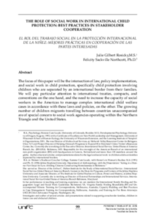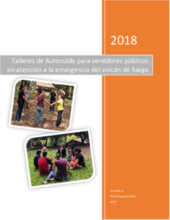Displaying 281 - 290 of 484
The introductory chapter of 'New Directions in Children’s Welfare' starts with a reflection from the author’s personal experience of social work practice and working with a family where the children are neglected and on the child protection register as a result.
Within this chapter (from the book 'New Directions in Children’s Welfare,') three child abuse inquiry and Serious Case Review reports are explored to understand the contemporary landscape of Children’s Services and the ongoing challenges involved in protecting children and young people from harm.
This chapter from 'New Directions in Children’s Welfare' aims to discover the delicate dynamics of trust within the specific professional and service user relations in work with children and young people who are either Looked After or at risk of significant harm.
The purpose of this study was to assess the perspective of social service providers who participated in a nine-month, trauma-informed care (TIC) training intervention on 1) their capacity to make referrals to trauma-specific services following the training, and 2) factors external to the training intervention that supported or hindered their ability to link traumatized youth with services.
This article outlines exploratory research in establishing a role for social work in child protection in Indonesia.
The focus of this paper will be the intersection of law, policy implementation, and social work in child protection, specifically child protection involving children who are separated by an international border from their families.
This is the first study in Ghana to explore child protection workers and parents’ experiences on participatory practices.
Este informe se detalla la propuesta metodológica para otorgar espacios seguros para que los servidores públicos que han atendido a los damnificados por una tragedia en Guatemala puedan descargarse emocionalmente y poner en práctica técnicas de autocuido.
This review seeks to identify and summarise findings from literature about the nature of relationships that develop between older children and young people, and those caring for them within and beyond residential and fostering settings.
This small pilot study to explores what is currently taught to future doctors about children in out-of-home care (OOHC) and found that there is no formal teaching about these children in the University of Melbourne Doctor of Medicine course.



